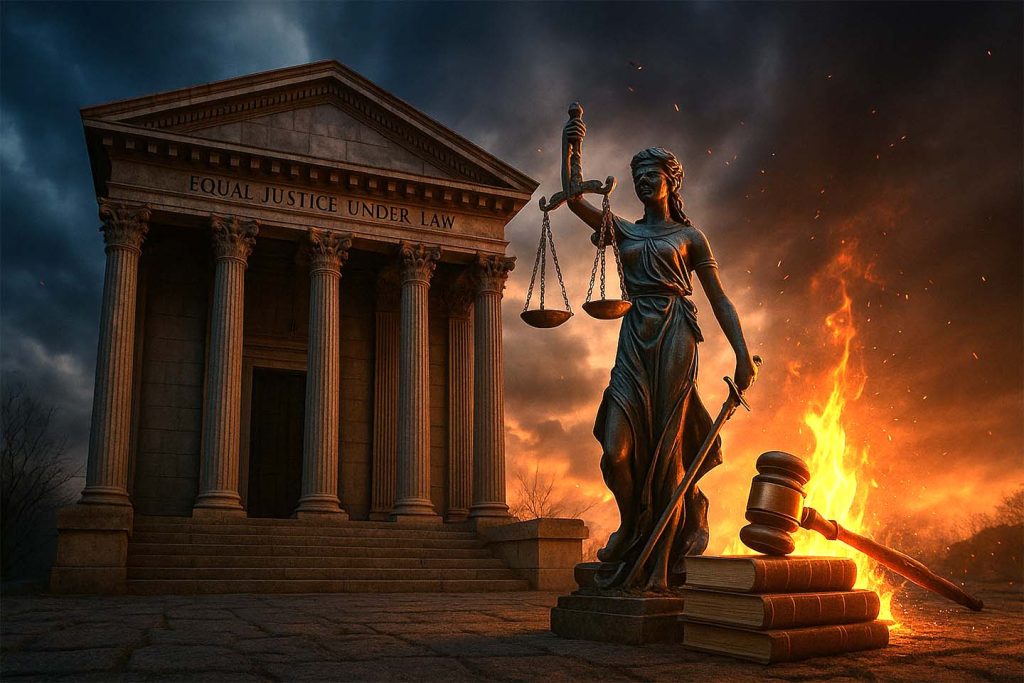
In the United States, the rule of law is more than a principle—it is the foundation of our democracy. It guarantees that laws are applied fairly, that legal rights are respected, and that the judiciary functions independently of political pressure. Recent political rhetoric and actions threatening this independence, including calls for the impeachment of judges, elimination of entire courts, and executive orders targeting law firms and lawyers, represent a direct assault on the very structure of our constitutional republic.
The Judiciary Under Fire
There is growing concern over efforts to undermine judicial independence. Some have proposed abolishing federal district courts whose rulings are unpopular. Others have sought to impeach judges based not on misconduct, but on disagreement with their legal reasoning. Such proposals are not just dangerous—they are antithetical to the U.S. Constitution.
The judiciary was designed by the Framers to be insulated from political winds, a co-equal branch of government responsible for interpreting the law and upholding constitutional protections. Attacks on this independence are attacks on every American’s right to due process, equal protection, and a fair hearing.
Executive Overreach: Targeting Lawyers and Law Firms
Equally troubling are executive actions aimed at law firms and attorneys for positions they have taken in litigation. Revoking security clearances, denying access to government buildings, and ordering investigations based on a lawyer’s advocacy violate core freedoms enshrined in the Constitution:
- First Amendment: Protects freedom of expression, association, and petitioning the government.
- Sixth Amendment: Guarantees the right to counsel, which would be hollow if lawyers are intimidated into silence or punished for representing unpopular clients.
These actions echo the darkest chapters of American history, when loyalty tests and blacklists threatened the careers and civil liberties of those who dared to dissent.
A Disturbing New Form of Intimidation: Weaponized Pizzas
In a bizarre and unsettling twist, judges across the country—particularly those presiding over high-profile or politically charged cases—have been targeted with a form of harassment that is both juvenile and malicious: unsolicited deliveries of dozens of pizzas to their homes or chambers.
While it may sound absurd at first blush, these “pizza bombings” are not innocent pranks. They are calculated acts of intimidation meant to disturb, harass, and send a message that someone is watching, and disapproving. These tactics waste time, resources, and—more chillingly—erode the sense of personal safety that every public servant deserves.
It may seem trivial compared to more overt threats, but such actions reflect a broader erosion of respect for the judiciary and a disturbing trend toward delegitimizing judges through mockery, bullying, and disruption.
When intimidation—no matter how petty or peculiar—becomes normalized, it undermines the very integrity of our justice system.
Historical Parallels: Constitutional Crises and Lessons Learned
History provides sobering reminders of the fragility—and resilience—of our legal system:
- The Sedition Act of 1798: Used by the Adams administration to criminalize criticism of the federal government. It was widely condemned and later allowed to expire.
- The Court-Packing Crisis of 1937: President Franklin D. Roosevelt’s attempt to expand the Supreme Court to secure favorable rulings. Public and congressional backlash preserved judicial independence.
- McCarthyism in the 1950s: Lawyers, judges, and citizens were blacklisted or prosecuted for alleged associations. The legal community’s response and landmark rulings by the Supreme Court restored constitutional protections.
In each case, the country was tested. And in each, it was lawyers and judges—often standing alone—who helped steer the nation back to its constitutional principles.
Why We Must Defend the Rule of Law
Today, the stakes are just as high. A nation without an independent judiciary is a nation where the powerful can act without restraint, and where the rights of the minority can be trampled by the will of the majority.
We must support the judges who apply the law faithfully, even when their rulings are unpopular. We must defend the lawyers who represent clients in difficult or politically sensitive cases. And we must push back against efforts to punish or intimidate those who fulfill these essential roles—whether through legislation, executive power, or a mountain of unsolicited pepperoni pizzas.
Because once the rule of law is undermined, restoring it is no simple task.
Conclusion
The rule of law is not self-sustaining. It requires vigilance, courage, and an unwavering commitment to constitutional principles. In defending the independence of our judiciary and the rights of lawyers to advocate freely, we are defending the freedoms of every American.

